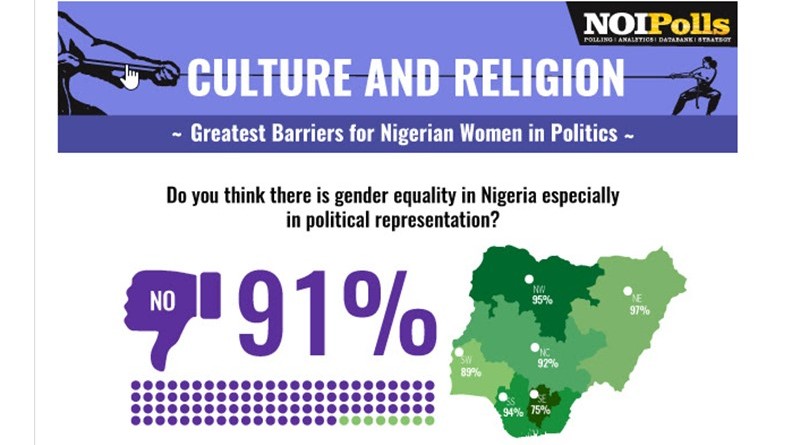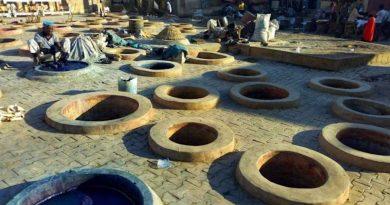Culture and Religion; Greatest Barriers for Nigerian Women in Politics – NOIPOLLS
International Women’s Day (IWD) is observed each year on 8th March and it is a worldwide event that celebrates women’s achievements ranging from the politics to social, while calling for gender equality in the world. NOIPolls joined the rest of world in celebrating the 2019 International Women’s Day which to recognize women who have succeeded in various leadership positions and have made extraordinary achievements in the nation’s building as well as impacting lives internationally. The theme for the 2019 IWD was “Think equal, build smart, innovate for change”. The theme focused on innovative ways in which gender equality can be advanced and the empowerment of women, particularly in the areas of social protection systems, access to public services and sustainable infrastructure.[1]
In commemoration of the International Women’s Day, NOIPolls reflects on some critical findings from its past poll on gender equality which gauged general perception of Nigerians about gender inequality especially in political representation. The poll which was conducted in March 2018 revealed that 91 percent of adult Nigerians admitted that there is a huge gap in gender equality especially in political representation in Nigeria, mainly due to cultural norms and religious beliefs (29 percent). It is very curial to re-emphasis that certain historic values shaped by societies, passed on from generations have over the years spelt out specific expectations from women in terms of attributes and behaviours such as the creation of gender specific roles. This has led to the labelling of some jobs and/or roles as ‘women’s work’ and ‘men’s work’ both in the household and in the wider community such as in workplaces, as well as in leadership, governance and politics. Further findings from the poll revealed that most Nigerians (85 percent) acknowledged that women make great leaders and this affirmation cuts across gender, geo-political zones and age-groups.
The chart below showed that the North-east (97 percent) and the North-west (95 percent) zones accounted for the largest proportion of Nigerians who believe there is gender inequality in the country. On the contrary, South-east (25 percent) accounted for the zone with the highest proportion of Nigerians who claim that there is equality in Nigeria.

More findings from the poll revealed that majority of adult Nigerians (29 percent) who claimed that there is gender inequality affirmed that cultural norms and religious beliefs are the main causes of gender inequality. Also, 17 percent of the respondents stated that gender inequality is obvious in Nigeria because women are perceived to be weak and lacks the capacity to lead amongst other reasons.
On the other hand, respondents who were of the opinion that there is gender equality gave reasons for their assertion and most of these respondents (37 percent) stated that there is gender equality because there are lots of women in politics in Nigeria. While 25 percent mentioned that women have equal constitutional right to contest political positions, 16 percent stated that representation is by merit and not by gender.

In conclusion, the poll results revealed that there is a significant gap in gender equality in Nigeria as stated by 91 percent of the respondents across gender, age-groups and geo-political zones majorly due to cultural norms and religious beliefs (29 percent). Considering the assertions made by Nigerians, it therefore calls for an urgent action to be taken in order to attain more women representation in the political sphere in Nigeria. For instance, the National Assembly should consider passing the Gender and Equal Opportunity Bill (GEOB) as this will greatly balance the gender gap currently existing in the Nigerian political sphere.
Disclaimer
This press release has been produced by NOIPolls Limited to provide information on all issues which form the subject matter of the document. Kindly note that while we are willing to share results from our polls with the general public, we only request that NOIPolls be acknowledged as author whenever and wherever our poll results are used, cited or published.
NOIPolls hereby certifies that all the views expressed in this document accurately reflect its views of respondents surveyed for the poll, and background information is based on information from various sources that it believes are reliable; however, no representation is made that it is accurate or complete. Whilst reasonable care has been taken in preparing this document, no responsibility or liability is accepted for errors or fact or for any views expressed herein by NOIPolls for actions taken as a result of information provided in this report. Any ratings, forecasts, estimates, opinions or views herein constitute a judgment as at the date of this document. If the date of this document is not current, the views and content may not reflect NOIPolls’ current findings and/or thinking.
-NOIPOLLS




